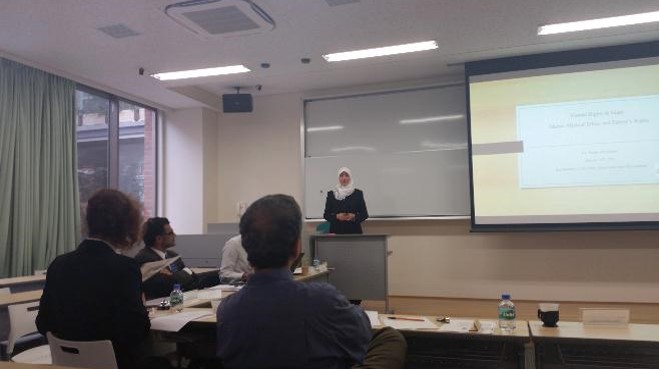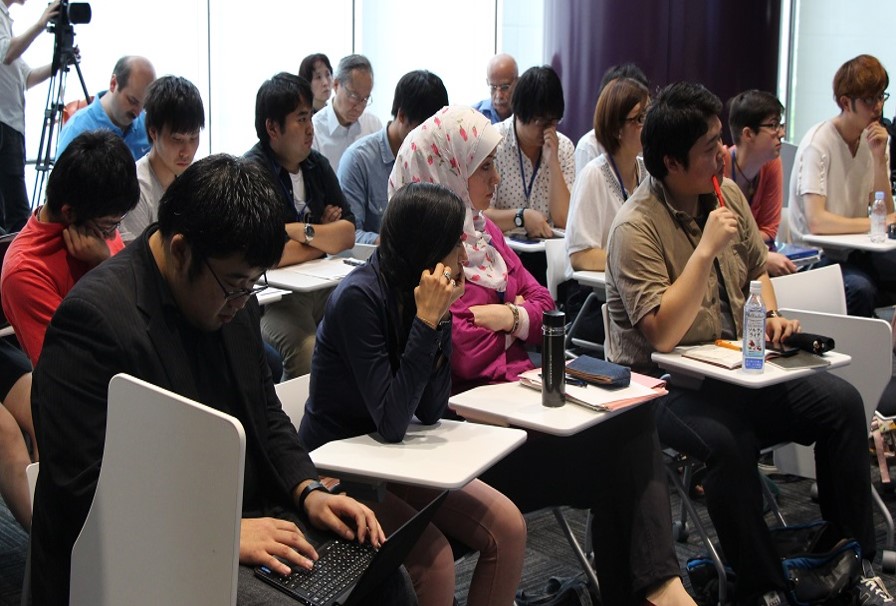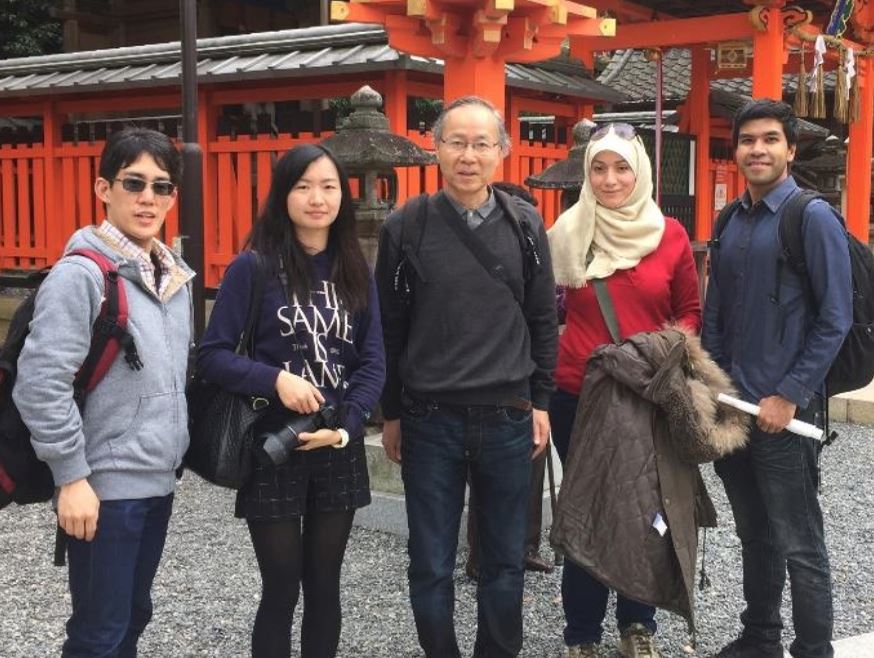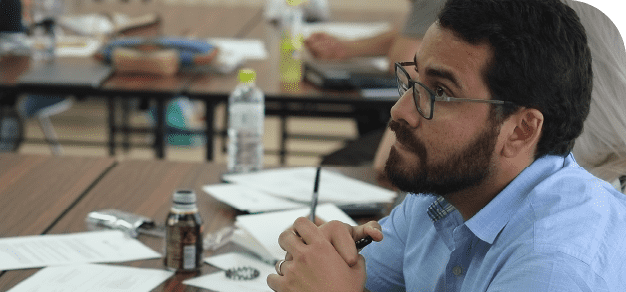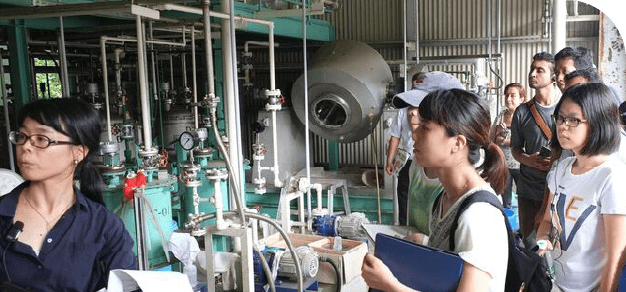GRM Students’ Reports
GRM Program Completion Report
Graduate School of Global Studies Rehab Abu-hajiar
2019/03/06
The idea of the GRM program appealed to me because it has facilitated participating and thinking seriously about possibilities of finding solutions to current global problems and challenges. In contemporary time, we face crisis of refugees, threatened diversity and coexistence in plural communities, lack of social justice, environment degradation and natural disasters and inadequate infrastructure. GRM emphasizes on reaching out and helping marginalized communities, regions suffering from conflicts and wars, people who lack basic needs of descent infrastructure. This is highly crucial and necessary in the face of increasing disparity and inequality at global level as communities have the right to live a normal, stable and dignified life. After enrolling and joining GRM program, I have become more aware and conscious by the newly gained GRM-based knowledge, discussions of global issues and examining ideas to tackle imminent challenges. It is indeed my hope that I can benefit as much as possible from my GRM’s journey of learning and experience in my future career.
I come from a military-occupied area, the Gaza-Strip, Palestine, where it suffers from many forms of problems; stringent military siege, unsafe drinking water, lack of electricity, inadequate medical services, political instability, the continuous specter of war and destruction. All of that pose a serious threat and challenges to daily life. My personal background prompted me strongly to take various GRM courses in different fields to maximize learning from lectures and discussions, debates, field work, onsite practices, joint projects, debates and thinking about alternative solutions. That is why when I joined the GRM program in 2015, I was very enthusiastic about taking all the required courses; without exception. I could relate to global issues discussed in the program such as devastating effect of war, resulting humanitarian crisis and depleting infrastructure caused by nature and Man, etc. The wars in Syria and Yemen are obvious tragic examples. Also, the world is witnessing the Rohingya refugees’ crisis, Philippines’ natural disasters, Islamophobia, xenophobia, rising nationalism in EU, refugee crisis and proliferating populism in the US and beyond, etc.
In my first semester in GRM Program, I joined a course about U.S. foreign policy and its relation to the US Constitution. It was highly informative. What amazed me was how decision-making in American body politics takes place. That class has opened my eyes and made me think about making a decision concerning war in the U.S. The decision to go to war against Iraq in 2003 is a historical turning point that changed the face of the Middle East. And that GRM course was very important to reflect back and think about how war decisions are produced in U.S. power structure.
In the same semester, I enrolled in Joint Seminar course, working with fellow students as a team on Inclusive innovation for sustainable development. That course was beneficial and inspiring. As a team, we discussed the concept of sustainable development and related United Nations Programs which supports the concept for the purpose of achieving the United Nations Millennium development goals. The result was a presentation of a paper at an international conference at Doshisha University under the title" United Nations and Inclusive Innovation for Sustainable Development." Our team addressed the important role of NGOs and civil society in supporting sustainable development. This course added a new dimension to the concept of development mainly by stressing upon involving all stake holders in the decision making of a development project. Development must be owned by every member of a community. Most developing countries suffer from an authoritarian top-down decision making which does not take into account the opinions and concerns of the locals. Such inclusive development is not only necessary but urgent.
During GRM Program, I conducted a fieldwork course in Turkey and Jordan to study and evaluate the application of biomedical ethics in the health sectors. The course allowed me to conduct numerous interviews with medical professional, scholars, officials, etc. The trip was very fruitful where I was able to meet some doctors who are working in Turkish hospitals. I also have visited some universities and educational centers in Turkey. In Jordan, I carried out field visits to universities, concerned ministries and a center related to follow-up research and experimenting involving humans. I have had many interviews with university professors, doctors working at the Ministry of Health, and members of the Jordanian National Committee for Medical Ethics. The visits were very successful, informative and very productive. I was able to collect enough information that helped me in my research.
Another GRM course involved organizing an international conference. This course was significant and productive in terms of personal benefit and research as well. I worked with my colleagues as a team to coordinate the conference. I invited Prof. Mohammed Ghaly from the Hamad Bin Khalifa University, HBKU, in Qatar. Dr. Ghaly is the most important professor in the subject of bioethics from an Islamic perspective where he is currently teaching at the Center for the Study of Islamic Legislation and Ethics, HBKU, in Doha, Qatar. The conference added a significant value to my research, presenting a new approach, and broadened my horizon. Having Prof. Ghaly, a world-renowned expert on Biomedical ethics, invited to Doshisha University represented a unique experience as far as my research concerned. It allowed for extended discussion on the subject of my research. During the conference, I presented a paper under the title " Human right in Islam; Islamic Medical Ethics and Patient rights."
Moreover, I joined two other GRM courses specializing in Planetary environment science and water resources. These subjects shed light on contemporary global issues and their impact on the environment and the problems that caused and threaten our planet; such as global warming, earthquakes, floods, and drought in some various regions across the world. GRM allowed the opportunity to learn about infrastructure in general and its link to social stability. One course was about "Introductory Laboratory of Infrastructure," and the other was "On-Site Practice 1". I enjoyed the Introductory Laboratory class because it gave me the opportunity to learn necessary information of creating electricity by designing simple electric circles. The course included learning about components, essential information about the resources of electric power. Having come from a place where an entire population gets only four hours of electricity on daily basis, one can certainly appreciate any simple solution to generate power even at small scale such as charging a mobile phone or a notebook computer. During emergency time, having a charged mobile phone can make a big difference or even save a life. A charged mobile phone is a chance to connect with civil defense or hospital ambulance or obtain vital information during emergency.
The crisis of water and poor infrastructure was another important course in the GRM program. This course provided me with a great deal of knowledge and information on water sources in Kyoto as well as Lake Biwa. Living in the historical city of Kyoto, I have benefited greatly from this subject, especially after my colleagues and I prepared some questionnaires for students who are studying in Doshisha University concerning public information on the sources and problems of water in Kyoto. It was very much a valuable experience to learn about water management from historical perspective as well as current circumstances. Water and its availability are vital area for development, stability and the wellbeing of children. In Gaza, for example, almost 90% of drinking water is not suitable for human consumption. And water is one major agitation and anger expressed by the people of Gaza.
Also, I had the opportunity to attend the 1st International Symposium of the Vacuum Society of the Philippines on 2016 between January 14-15. This symposium gave me a new approach to the development and advancement of vacuum technology, plasma science, and allied fields. The subject was not related to my research, but it is strongly related to advanced global technology that we are part of it and surrounds us. And at least we have to be aware of it and its knowledge.
Joining GRM program gave me an excellent and invaluable opportunity to learn about global issues such as conflicts, humanitarian work, diversity, coexistence, water, electricity economic inequality, natural disasters in addition to political topics and policymaking in the world. This program presents a turning point for my thinking in addition to research interest. It harnessed my critical thinking about global issues, some of them mentioned above, and in the meanwhile to try to find alternative solutions in an environment of working collectively. I have become more convinced that teamwork makes miracles. It makes a tangible difference when you have to work within a group. I can say that this program has strengthened my confidence in the ability to follow up major global issues and discuss them with specialists. This confidence came through several meetings and sessions with professors and students in many research subjects and got used to the idea of dialogue and discussions.
